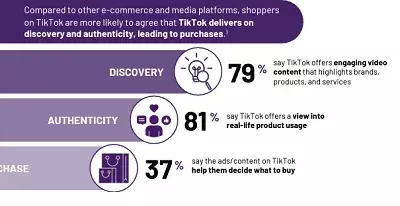TikTok has revolutionized social media engagement, captivating millions of users globally with its short-form video content. In the United States, the app’s utility as a product discovery and shopping tool has garnered significant attention. A recently released survey by TikTok in collaboration with Ipsos presents intriguing data regarding its emerging role in e-commerce. With potential regulatory actions threatening its existence in the U.S. market, the findings of this report present a unique crossroads for TikTok and American consumers.
TikTok’s unique blend of entertainment and commerce plays a pivotal role in product discovery. Its algorithm promotes trending products showcased by influential creators, turning them into a powerful marketing tool. According to survey results from over 3,800 U.S. internet users, TikTok’s ecosystem enhances product insights that guide shopping behaviors. This engagement fosters an environment where users are more likely to explore and purchase trending products, positioning TikTok as a crucial player in the contemporary e-commerce space. The report highlights that users often turn to TikTok for inspiration, a trend that seems to outpace other platforms, making it an attractive venue for brand promotion.
Comparison with Other Platforms
The survey also draws comparisons between TikTok and traditional e-commerce platforms. Different from conventional shopping experiences that may feel transactional and impersonal, TikTok’s dynamic environment encourages emotional engagement, making the shopping experience enjoyable. Users often engage with creative and entertaining content that transforms how they perceive brands and products. This distinctive approach yields increased consumer trust and interest in making purchases via the app. The ability to weave storytelling into the shopping experience undoubtedly sets TikTok apart from other e-commerce giants like Amazon or eBay.
Despite not yet rivaling its Chinese counterpart in sales volume, TikTok’s shopping functionalities are gaining traction among U.S. consumers. Survey data shows that users are increasingly comfortable making purchases directly through the app. The report indicates a gradual shift in spending behaviors as users navigate through TikTok’s shopping features. This scenario bodes well for retailers eager to tap into this burgeoning market. The evolving consumer behavior suggests that TikTok could potentially become a more significant player in the e-commerce sector as users continue to integrate it into their shopping routines.
For U.S. retailers, the findings from TikTok’s report are critical in re-evaluating marketing strategies. As the app continues to grow in influence, businesses need to consider how to engage users through captivating content that resonates with their target audience. The report offers valuable insights on content creation, highlighting the importance of authenticity, creativity, and alignment with current trends. Retailers should see TikTok not just as a platform for advertisement but as a space to foster relationships with consumers through interactive content.
Despite the promising insights, TikTok’s future in the U.S. remains uncertain due to ongoing regulatory scrutiny. The potential ban, stemming from national security concerns, places a dark cloud over its operational viability. The discussions about the app being sold to a U.S. company, or the possibility of regulatory concessions, underscore the complexities facing the platform. Current political dynamics normalize the contentions surrounding tech giants and national security, impacting TikTok’s operational framework.
While the report’s insights showcase TikTok’s potential to reshape how consumers discover and purchase products, the looming exit from the U.S. market complicates the narrative. Should TikTok manage to navigate the current challenges, it would solidify its status as a transformative force in e-commerce. Retailers who adapt their strategies based on these insights may find themselves at the forefront of a retail evolution, leveraging TikTok’s unique model for future success. As the landscape evolves, stakeholders must remain agile, prepared for changes that could dictate the trajectory of not only TikTok but the entire social commerce sector.


Leave a Reply